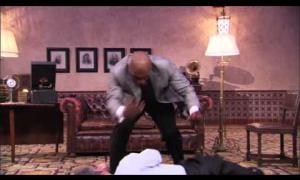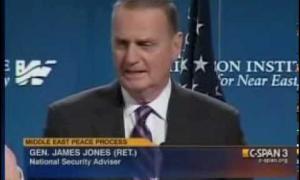Rhetorical Recap: The Speech
January 23, 2017
By failing to adjust his rhetoric to the strategic circumstances of the Inauguration, President Trump bolstered his opposition.
Incoming presidents with ambitious agendas recognize that they have to start fast and move far on multiple fronts while the opposition is still dazed by the election and the media are disposed to cut the newcomer slack in exchange for access to the big story aborning (aka “the honeymoon”). In non-crisis times, the conventional approach to the Inaugural Address has thus been to signal the start of a great American journey and invite everyone along. The more who climb aboard, the farther the new administration can get.
Yeah, well, so much for that. The relo from the Tower to the White House was conducted under a siege mentality that elicited equally intense repudiations from a variety of political quarters. Accordingly, the defensive sense of persecution suffusing the Inaugural Address fulfilled its own prophecy in the course of a single weekend. The Address touched off an intense clash of words and worldviews.
The Address
President Trump began his tenure with a confrontational speech delivered in clenched-fist fury. Having huffed and puffed and blown down the Bush and Clinton houses, this Big Bad Wolf drew a yuuuge breath and let his fur fly at the betes noires from the 2016 campaign: Washington politicians, job-exporting corporations, Radical Islamic Terrorists, the doubters, the media, the world beyond America’s borders, everyone and everything who saw things differently.
Hey. You won, remember?
Not yet we haven’t, said Trump and his primary speechwriters Steve Bannon and Steven Miller. From their point of view, the new president was not a children’s story villain but a video game avatar, the fantastic protagonist of a special POTUS 45 edition of Call of Duty: Infinite Warfare.
Trump’s words were stark instead of flowery. This generated moments of eloquence: “In America, we understand that a nation is only living as long as it is striving.”
He continued to espouse a populist and nationalist ideology, sealing his electoral bond with the “forgotten” men and women of the country. “You will never be ignored again,” he assured them. “Everyone is listening to you now.” The billionaire tribune of the beleaguered—an alliance with historical precedents, although they would go unmentioned—pledged to put the kibosh on the antagonists from other lands who have been “making our products, stealing our companies, and destroying our jobs” (but not disrupting our campaigns through cyber-warfare.) The Address extended a promise of New Deals to come, as negotiated by a man with a neo-Jacksonian attitude. The name chosen for this approach to governance? That was actually appropriated from the American past: “From this day forward, it’s going to be only America first. America first. Every decision on trade, on taxes, on immigration, on foreign affairs, will be made to benefit American workers and American families.”
Trump spoke in an immediate time frame, an insistent “right here and right now.” That was a stripped-down equivalent of yet another precedent, “the fierce urgency of now.” Trump thanked the man who said that, and his wife, but only for graciously helping them with the relo. The new president acknowledged his other predecessors in attendance, too, but not their accomplishments.
Trump’s here and now was not intended for politics as usual. Expression and debate were acceptable to a degree, said the president, but: “We will no longer accept politicians who are all talk and no action – constantly complaining but never doing anything about it…The hour of action has arrived.” It would be an hour in which “the course of America and the world” will be determined “for many, many years to come.”
In lieu of historical continuity, as I have alluded, the Inaugural Address projected the ambience of a first person shooter video game. The audience was invited to imagine a fast-moving, hyper-realistic, dangerously degraded environment:
The wealth of our middle class has been ripped from their homes and then redistributed across the entire world….Mothers and children trapped in poverty in our inner cities, rusted-out factories scattered like tombstones across the landscape of the nation.
The Responses
Trump had painted a similarly dystopic picture in his campaign speeches, notably when accepting the Republican nomination. Familiarity may have been a motivation behind the first palpable reaction to the Inaugural Address. A few blocks to the northwest of the Capitol, in seeming confirmation of TrumpWorld’s neon-lighted tableaux of intensified peril, anarchists trashed and burned a limousine on K Street. Hours later a contributor to one of my friend’s Facebook page wrote that the liberal “dishonest” media was playing down the anarchist news story, that George Soros funded them, and that she felt like a Jew in Nazi Germany.
Meanwhile, President Trump had walked into the Capitol for the traditional luncheon with members of Congress. Senate Majority Leader Mitch McConnell took Inaugural Chairman Roy Blunt’s seat to talk intently with Trump. As reported in Politico:
In a room filled with the country's most powerful people, for 15 minutes only two of them mattered: Donald Trump and Mitch McConnell. The Senate majority leader and newly sworn-in president engaged in an animated and close conversation — with the often subdued McConnell doing most of the talking.
One reason Team Trump may feel besieged rests in the fact that McConnell, House Speaker Paul Ryan, and the Republican majorities in Congress already possess sufficient evidence to send the president down the chimney of impeachment, trial, and removal. (Yes, it takes 2/3rds majorities. Democrats will fill out the count.) Trump stands in direct, ample, and unambiguous violation of the emolument clauses of the Constitution. He has yet to file documents to make even the nominal corrective moves his lawyer outlined at his pre-Inaugural news conference. A bipartisan coalition of lawyers filed suit against him today. These drastic circumstances reinforce the Republican leadership’s leverage in domestic policymaking.
Trump has also strained relations with the intelligence community. John Brennan, who has left his post as CIA Director, but may be presumed to have spoken for a good number of those still at The Agency in expressing his outrage at Trump’s self-absorbed ramble in front of the wall of heroes at Langley on Saturday. It’s likely they too possess damning evidence of Trump malfeasance, perhaps about his connections with the Kremlin and Russian oligarchs. Trump did offer conciliatory words of praise amid his boasting and blustering. But, as with Congress, he lacks the normal leverage of presidents when they decide to launch covert operations.
Trump routinely describes the news media as dishonest. This weekend, he excoriated them yet again, abetted by his communication aides Sean Spicer and Kellyanne Conway. The facts about crowd sizes may appear trivial, but Trump’s claim to be an authentic tribune for the people is implicated in the comparative claims. When the trio descended from exaggerations and spins into patent lies, the media called them on it. Journalists may not yet have what Congress and CIA have, but as the leading scapegoats in the video game, a good number of them appear ready to go public with whatever new damning information comes their way.
Repudiation came as well, of course, from the millions who marched on Saturday on the National Mall and hundreds of places around the nation and world. Many sported cute pink knit caps with pointy ears; these were naughty references to the P-word Trump notoriously used in the Access Hollywood tape, but they, along with the spirit of joyful derision the protesters exuded, put me in mind of the song and story I have chosen as my emblem to juxtapose with the videogame.
In the 1930s, “Who’s Afraid of the Big Bad Wolf” became an unofficial anthem of a nation struggling to overcome the ravages of the Great Depression. Today, the house where the piggies find refuge and revenge does not exist in strict political terms. The bricks have yet to be laid. But a P— Party counterpart to the Tea Party that formed in 2009 is a lot more likely to develop than it was last week. Trump helped made that happen by failing to adjust his rhetoric to the strategic and symbolic circumstances of the Inauguration. He can recoup, of course. He and the Republicans will enact policy changes in the next hundred days, exercised power they have earned.
Still and all, the Inaugural Address made more enemies than friends. Along with the spin that followed, it failed to expand the coalition every president needs to govern.



